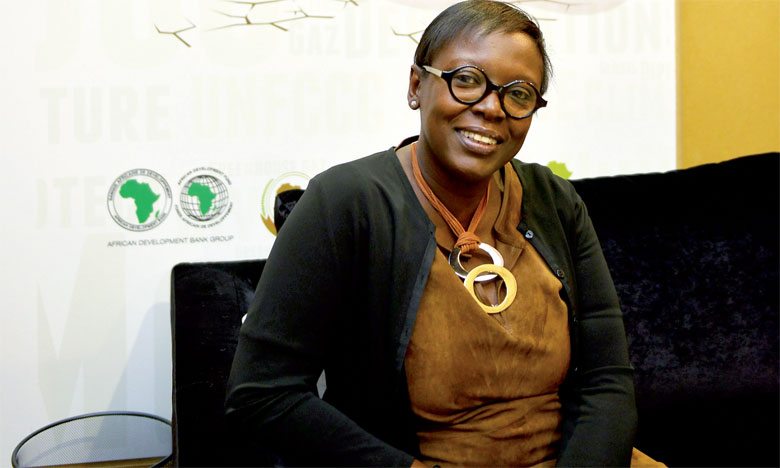
Emmanuel Eze (Left) holding his award plaque and ATAF’s Director of Research, Nara Monkam at Serena Hotel, Kampala Uganda a moment after Eze received award for the best essayist for ATAF Tax Essay Competition, 2019
Nigerian, Eze, Wins Africa’s Tax Writing Competition
Emmanuel Eze, a Nigerian with the Federal Inland Revenue Service (FIRS, Nigeria) has won a continental tax essay competition organised by the African Tax Administration Forum (ATAF) for 2019. Eze trounced 132 other tax writers from across the African continent to emerge the best essayist.
Eze, who received the award at the just concluded ATAF’s 10 years Anniversary and the International Conference on Tax in Africa (ICTA) held in Kampala, Uganda submitted an entry titled: Taxation Of Digital Economy And Africa’s Quest For Fiscal Justice: Challenges And The Need To Put Our Best Foot Forward.
A letter by ATAF’s Director, Research, Dr. Nara Monkam, notifying Mr. Eze of the Award stated: “The African Tax Administration Forum (ATAF) is pleased to announce the winners of the 2nd Africa-wide Tax Essay Competition for 2019.
Said Monkam: “We received a total of 103 essay submissions from across the continent were received out of which 93 were accepted for evaluation. The evaluation process consisted of two main phases. In the first phase, seven tax professionals shortlisted the best 15 essays out of the 93. In the second and final phase, a Jury comprising of three experts in the field of tax and digitalisation (from the ATAF Secretariat and University of South Africa) identified the 1st, the 2nd and the 3rd Award Winners.
“The Jury also selected seven other best essays to make a total of top 10 essays that are to be published in ATAF’s 2020 Compilation of Abstracts on Tax Systems in Africa. The following are the winners of the 2019 Africa-wide Tax Essay Competition:1st position, Emmanuel Eze from Nigeria; 2nd position, Makoni Prince Tonderai from Zimbabwe; 3rd position, Ann Githinji from Kenya”, it read.
It was a sight to behold as Nigeria’s Eze Emmanuel mounted the dizzying podium with all eyes on him to receive the award of the best African Tax Writer of the year at a dinner at the Serena Hotel Kampala, Uganda.
Eze opened his article with an allusion to Chinua Achebe’s statement in A Man of the People: “A goat does not eat into a hen’s stomach no matter how friendly the two may be” and successfully argued that Africa should not be fooled by Europe and developed world’s “friendliness and collaboration”, in the taxation of the digital economy, as “a goat does not eat into a hen’s stomach, no matter how friendly the two may be”.
Eze said: “According to recent report, 60 of the world’s 500 largest companies, including Amazon, Netflix and General Motors, paid no taxes whatsoever in 2018, despite a cumulative profit of $79 billion, because the existing International Tax rules allows them to do so. These rules are premised on sharing taxing rights between source and residents’ states. Under the rules, MNEs are taxed on their income from source states -e.g, developing countries in Africa – where they have physical presence or Permanent Establishments (PE) and the incomes subject to tax are those that are attributable to such PE.
“These rules, namely, nexus and profit allocation rules are fraught with loopholes which enable the MNEs to fleece the continent of billions of US Dollars annually. To make matters worse, the rules predate the current technological advancement and all the complexities it has brought to the way and manners that MNEs organise and do business. Put differently, the rules do not take cognisance of the fact that the world leading companies like Netflix, Amazon, Facebook, Google, etc do not need to have physical presence in Africa to reap massive profits from the continent. Consequently, proposals are made to reform the rules to make them more responsive to the current technological and digital realities”, it read.
He deployed qualitative method to analyse the current issues around taxation of digital economy inclusive of the various proposals, the key players, etc, in a bid to decipher their implication for Africa and how the continent could win her quest for tax justice.
In conclusion, Eze recommended that the continent should seek to boost technical capacity in both international tax and the taxation of digital economy.
Said Eze: “The continent should also call for an independent and more neutral body, possibly overseen by the UN to assimilate or take over the current work of Inclusive Framework (IF) or seek for more entrenched participation at the Organisation for Economic Co-operation and Development (OECD). The continent should realise that active campaign and political lobbying at the global level may be necessary to push key policy reforms that will recognise the peculiarities of Africa and the current injustice suffered by the continent as result of International Tax Rules skewed against her.
“The rules are also still too complex; the continent should call for the simplification of these rules for ease of administration. Also, the cost of attending meetings to participate in the rounds of negotiation may be hard on some African countries, the continent may call for a fund to sponsor participating African countries to attend relevant meetings where issues affecting their taxing rights are to be determined to ensure that they are not technically excluded by paucity of funds. Above all, the continent should not be fooled by Europe and developed world’s “friendliness and collaboration”, in this matter, as “a goat does not eat into a hen’s stomach, no matter how friendly the two may be”.
Seven more authors made it into the 10 best essays in the 2019 ATAF tax essay competition. They are: Christine Mwaja from South Africa; Yenda Shamabobo from; Zambia; Sydwell Nsingo from Zimbabwe; Jeremiah Makumba from Zimbabwe; Winnie Jepchirchir from Kenya; Henry Sithole from Zimbabwe and Frank Musabe from Rwanda.
Emmanuel Eze, a Barrister, is a Deputy Manager, Legal Services with the Tax Policy and Advisory Department of the Federal Inland Revenue Service of Nigeria. Emmanuel has been involved in tax treaty negotiation between Nigeria and several countries. He is in the Nigerian Base Erosion and Profit Shifting (BEPS) Implementation Committee and is passionate about forestalling fiscal evasion and the depletion of the country’s tax base. He has contributed, in various fora, to the ongoing discussion on the taxation of the digital economy culminating into his continental prize-winning essay: “Taxation of Digital Economy and African’s Quest for Fiscal Justice: Challenges and the Need to Put Our Best Foot Forward”.
He has worked in various committees within the public sector, including Enlarged Focal Point on Trade Negotiation, the Presidential Committee on African Continental Free Trade Area Agreement (AfCFTA), Common Reporting Standard for the implementation of Automatic Exchange of Financial Information (CRS) Implementation Committee.
Eze contributed to the drafting of such technical documents like the Country-by-Country Reporting (CbCR) Regulations 2018, CbCR Guidelines, CbCR Guideline on Appropriate Use of CbCR, Transfer Pricing Regulations, 2018, Transfer Pricing Guidelines, Mutual Agreement Procedure (MAP) Guidelines 2019, CRS Regulations, 2019 and the CRS Guidelines.
Eze is a litigation lawyer, a prosecutor and legal Adviser. He is an alumnus of the prestigious Melbourne Law School, Australia, where he obtained a Master of Laws degree in International Tax under the tutelage of renown International Tax experts like Professor Peter Harris, the Head of International Tax at Cambridge University and Professor Brian Arnold, the Head of Canadian Tax Institute. He obtained his first degree and legal practice license from University of Nigeria, Nsukka and Nigeria Law School respectively.
THE WINNING ESSAY
TAXATION OF DIGITAL ECONOMY AND AFRICA’S QUEST FOR FISCAL JUSTICE: CHALLENGES AND THE NEED TO PUT OUR BEST FOOT FORWARD, BY EMMANUEL EZE
“A goat does not eat into a hen’s stomach no matter how friendly the two may be” -Chinua Achebe.[1]
African Nations are working “closely” with other nations, led by the OECD under the auspices of the “Inclusive Framework (IF)”, to find a multilateral solution to the tax challenges posed by the digitalization of the global economy. All parties to the ongoing discussions are supposedly participating on “equal footing”. While expressions like “inclusive” and “equal footing” are appealing to the Continent, we draw from Achebe’s wisdom, to sound a cautious note that even within a multilateral solution, the OECD will push for a solution that best suits the OECD while Africa must fend for herself. Given that the developed nations, typified by the OECD, have more human, political, and financial resources to make their views prevail, it is doubtful if the use of the phrase “equal footing’ is as deep rooted as projected. Africa should be mindful that the Multi-National Enterprises (MNEs), who are the primary beneficiaries of weak and skewed international tax rules are capable of influencing policies of their governments and are predominantly located in the developed nations.[2] To this end, what is in the best interest of the OECD may not, in all cases, be in the best Interest of Africa. Africa, therefore, must rise to scrutinise all proposals for taxation of digital economy in order to defend her tax base and mobilise revenue to drive sustainable development in the continent.[3] This paper opines that the current clamour to remake international tax rules is and should be for Africa, a fight for Fiscal Justice, not just a drive for a marginal increase on taxing right.[4]
According to recent report, 60 of the world’s 500 largest companies, including Amazon, Netflix and General Motors, paid no taxes whatsoever in 2018, despite a cumulative profit of $79 billion, because the existing International Tax rules allows them to do so.[5] These rules are premised on sharing taxing rights between source and residents’ states. Under the rules, MNEs are taxed on their income from source states -e.g, developing countries in Africa – where they have physical presence or Permanent Establishments (PE) and the incomes subject to tax are those that are attributable to such PE.[6] These rules, namely, nexus and profit allocation rules are fraught with loopholes which enable the MNEs to fleece the continent of billions of US Dollars annually.[7] To make matters worse, the rules predate the current technological advancement and all the complexities it has brought to the way and manners that MNEs organise and do business. Put differently, the rules do not take cognisance of the fact that the world leading companies like Netflix, Amazon, Facebook, Google, etc do not need to have physical presence in Africa to reap massive profits from the continent. Consequently, proposals are made to reform the rules to make them more responsive to the current technological and digital realities.
This article would deploy qualitative method to analyse the current issues around taxation of digital economy inclusive of the various proposals, the key players, etc, in a bid to decipher their implication for Africa and how the continent could win her quest for tax justice.
The proposals are built on two pillars: pillar one and pillar two. While pillar one addresses issues around allocation of taxing right and the remaking of the nexus rules; pillar two deals with broader Base Erosion and Profit Shifting (BEPS) issues that have not been tackled by the BEPS project. Under pillar one, proposals like User Participation, Marketing Intangible and Significant Economic Presence has been made.[8] However, the Unified Approach proposed by the OECD Secretariat is the current trend.[9] The approach covers four elements: scope, economic nexus, formulary apportionment profit allocation, and binding dispute resolution. Under the scope element, it is proposed that the new rule should cover more than highly digitalised MNEs but with a carve out to extractive industries. The economic nexus element proposes that the new nexus rule to tax digital economy will dispense with physical presence and rely majorly on other criteria, such as a sales/revenue threshold. The revenue threshold would consider digital activities, such as online advertising services that target users in locations that are different from the locations wherein the relevant revenues are booked. The mechanism proposed for bringing this into being is to include a new standalone economic nexus article in tax treaties.
The formulary apportionment profit allocation suggests that the new profit allocation will be based upon an approximation formulaic approach without the need for precise arm’s length benchmarking. The new allocation rule would apply to both profit and losses and the mechanism are: -Amount A – a share of deemed residual profit allocated to market jurisdictions using a formulaic approach, i.e. the new taxing right; ‒ Amount B – a fixed remuneration for baseline marketing and distribution functions that take place in the market jurisdiction; and ‒ Amount C – binding and effective dispute prevention and resolution mechanisms relating to all elements of the proposal, including any additional profit where in-country functions exceed the baseline activity compensated under Amount B. Public discussions are solicited on this proposal in preparatory to submission of a final report to the G20 in 2020.
It is clear from the above, that the emerging reforms entail not just a change of rules but also increased global governance for tax. The reference to binding dispute resolution is an example. How is Africa represented at that level of governance when OECD and G20 have overwhelming interest in determining the direction of the reform? It is also clear that Amount A will be based on “deemed” residual profit. Who will be doing the deeming, and would this not expose the continent to similar issues as we are currently suffering under transfer pricing and its arm’s length principles? How many African countries has the political and technical capital to drive significant interest at the IF? Is there a reasonable number of Africans working at the OECD?
In conclusion, it is recommended that the continent should seek to boost technical capacity in both international tax and the taxation of digital economy. The continent should also call for an independent and more neutral body, possibly overseen by the UN to assimilate or take over the current work of IF[10] or seek for more entrenched participation at the OECD. The continent should realise that active campaign and political lobbying at the global level may be necessary to push key policy reforms that will recognise the peculiarities of Africa and the current injustice suffered by the continent as result of International Tax Rules skewed against her.[11] The rules are also still too complex,[12] the Continent should call for the simplification of these rules for ease of administration. Also, the cost of attending meetings to participate in the rounds of negotiation may be hard on some African countries, the continent may call for a fund to sponsor participating African countries to attend relevant meetings where issues affecting their taxing rights are to be determined to ensure that they are not technically excluded by paucity of funds. Above all, the continent should not be fooled by Europe and developed world’s “friendliness and collaboration”, in this matter, as “a goat does not eat into a hen’s stomach, no matter how friendly the two may be”.
[1] Chinua Achebe (1988). “A Man of the People”, p.125, Heinemann
[2] Jose Antonio Ocampo, “A Time for Developing Nations to speak Up” Dhaka Tribune(www.Dhakatribune.com) 17/10/19
[3] It must be noted that ATAF has taken up this responsibility by issuing series of technical notes in this regard, however, all African nations represented at IF should be more ambitious in their demands.
[4] WBG (2019) “International Tax Reforms, Digitalization and Developing Economies” MTI Discussion Papers, October 2019. P. 3
[5] Ibid, footnote 2
[6] Articles 5 and 7 of the OECD, UN and ATAF Model Tax Treaties.
[7] The annual losses, for Africa, are estimated at $100 Billion see ibid, note 2.
[8] OECD (2019), Addressing the Tax Challenges of the Digitalisation of the Economy.
[9] OECD (2019), Secretariat Proposal for Unified Approach Under Pillar 1.
[10] ICRCT has called for this view as well
[11] African Tax Administration Paper June 2019, p. 30, ATAF member states agree on the fact that the rules are skewed against Africa.
[12] Complexities of the rules is one of the biggest enablers of avoidance, see ibid page 21.




Recent Comments